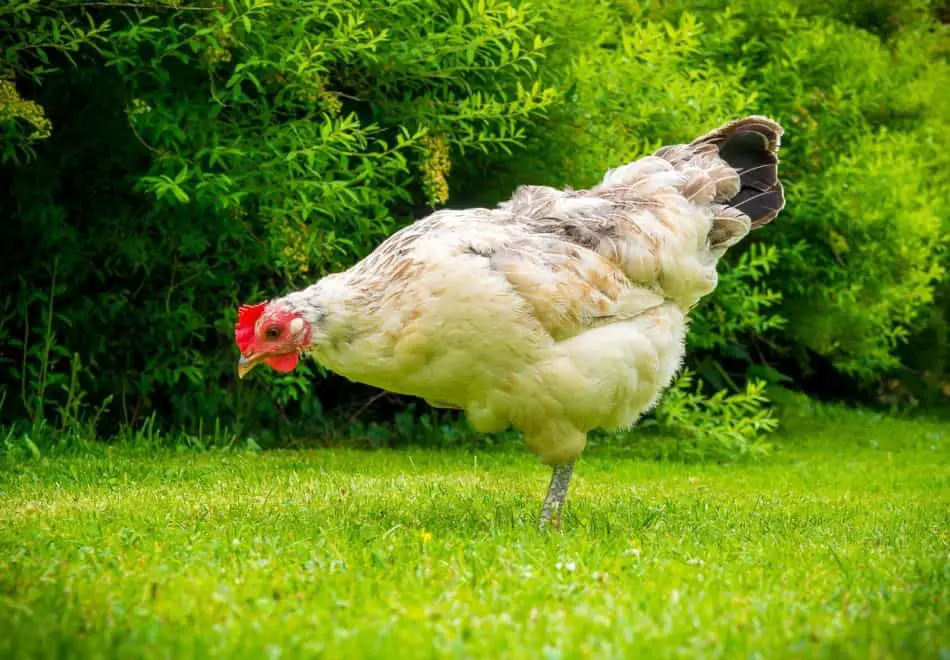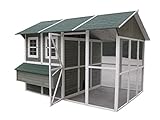The thought of having freshly laid eggs for breakfast from chickens kept at home is one that fills my thoughts with country gardens and huge lawned backyards. However, you don’t need a big backyard or garden to keep chickens at home.
Keeping chickens at home is fast becoming one of the most popular and trending things to do. But keeping chickens although it has become easier still comes with some cautions.
In this article we’ll give you 31 Helpful tips for keeping chickens at home.
Having chickens as not only a means to get freshly laid eggs for breakfast every morning but also as pets where you can show them just as much care, love and attention you would your cat or dog.
Let us see what helpful tips we can give you before you decide to keep chickens at home.
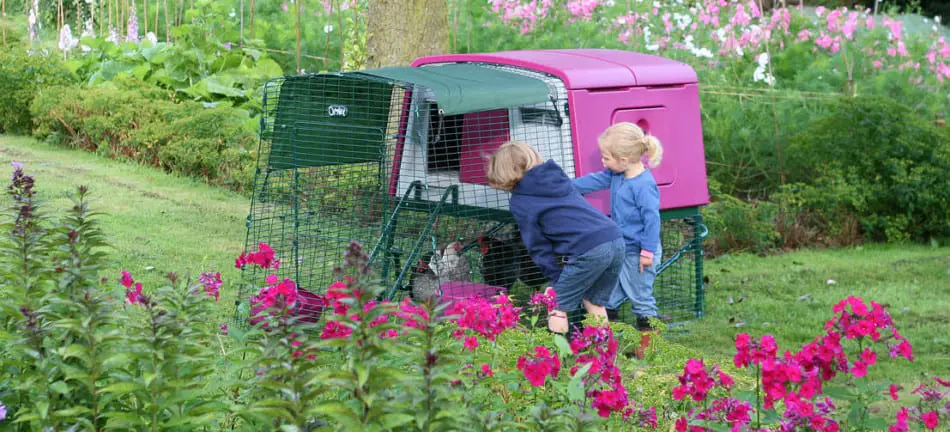
Table of Contents
31 Helpful tips for keeping chickens at home
31. Chickens can be very destructive animals and will dig up patches in your lawn or grassed area. Ensure you have a coop that can be moved around from time to time to allow you to re-seed and patch up your lawn.
30. Chickens don’t like to get too hot. You’ll need to provide them with shade and shelter even if they are free-roaming in your garden. A little makeshift wooden shelter will allow them to escape the direct sun, especially through the hot summer months.

29. Chickens like to clean themselves and are not dirty animals at all. In fact, chickens take a bath at least once a day. But not in water. They bath in sand baths.
Simply place a large container full of sand ( We use red builders sand ) which will allow them to dig around and shake off any bugs or parasites that may be living on them.
28. Chickens don’t like to get wet and therefore you need to provide a dry and comfortable shelter from the rain. I would make sure they have shelter from the rain alongside their sleeping coop so they can just pop inside when the rain starts.
Rather than heading back into their coop which you want to keep as clean and dry as possible.
27. Chickens need light for at least 12 hours a day. The more light they have the better egg production you’ll see. In darker winter days provide a low wattage light inside their coop for at least 12 hours. Solar-powered coop lights are an efficient way to light their coop for 12 hours.

26. Think about where you can place sick chickens or chickens that have been pecks or bullied. Chickens do fight ( Most days ) and can sometimes get injured or tired from these fights.
It may be necessary to isolate one for a short period of time to rest and recuperate. Think about where you would house them when and if this were to happen.
25. Not all chicken prefer to sleep in the same manner. Egg-laying chickens like to sleep on perches and higher up. Other chickens like to sleep on the floor. In which case you’ll need to provide suitable sleeping arrangements for both.
24. Don’t use hay for bedding. Chickens will try to eat the hay and hay is made up of long strands that can easily get stuck in their necks. Use Straw for bedding or even better wood shavings.
Do not use wood chippings as these can be harmful. Wood chippings can harbor fungi and other harmful things that can harm your chickens.

Use top quality wood shavings with can be purchased in large bales very inexpensively on Amazon or from your local pet store.
23. Wood shavings are easier to clean out of your coop. You don’t have to replace all the shavings. Simple pick out the chicken poo with a small pitchfork or shovel and throw them away. You don’t have to replace it all each time you clean the coop out.
22. Clean their coop out weekly and use a disinfectant to kill any mites or parasites. Chickens are surprisingly clean animals but mites can get inside their coop. We use Mite spray on all the coop surfaces to kill any harmful little bugs.
21. Chickens need a varied and balanced diet which mainly consists of pellets which contain all the protein, Calcium and vitamins they need daily. We supplement the pellets with fresh greens, corn, and fruits.
20. In colder winter months you can feed you chickens with whole wheat grains. Wheat grain help to raise your chicken’s body temperature which will help them to keep warm through winter.
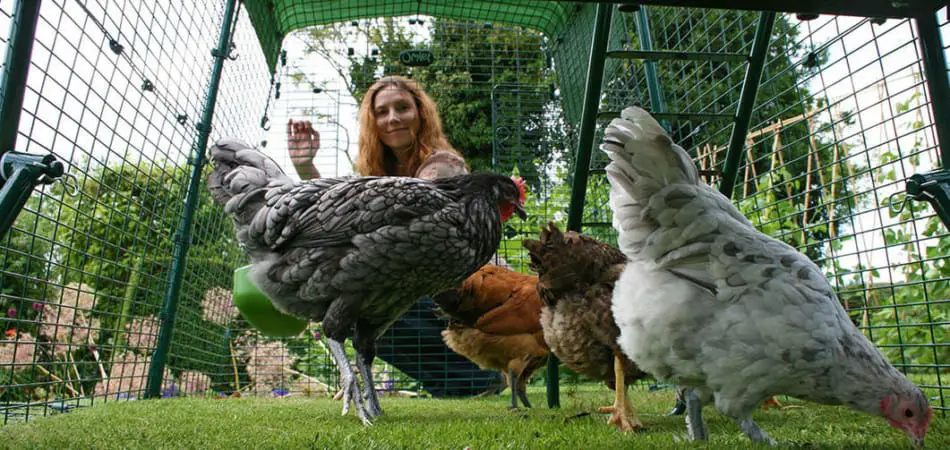
19. Orange yolks are the result of chickens eating more foods that are high in carotene. Yellow yolks come from chickens eating less carotene. A good source of Carotene is spinach, alfalfa, basil, dandelion greens, or marigolds.
Chickens that are allowed to roam freely around your garden will eat bugs, insects, and plants that contain carotene hence their egg yolks are normally deep yellow and yummy.
18. Give your chickens a treat from time to time. Fruits found growing wild in many gardens can provide a lovely treat and snack for your chickens like Strawberries, blueberries and apples. However, these should only be given as treats and snacks and not used as their staple diet.
17. Always store foods, grains and pellets in an airtight container for two reasons. Firstly to keep the food as fresh as possible and secondly to ensure it does not attract any unwanted rodents like mice or rats. Rats can smell chicken feed a mile off.

16. In the UK there’s a law that prevents you from feeding your chickens any food peelings directly from your kitchen. The reason scraps and peelings are illegal for chickens and other pets is the potential for contamination in a domestic kitchen leading to disease transference and disease risk.
If you want to feed your chickens kitchen scraps then simply peel the veg outside, feed the scraps and peelings to your chickens, and then bring your veggie inside to wash and cook.
15. Chickens are messy eaters and don’t mind throwing their food all over the garden. So, we suggest using a chicken feeder. These come in many shapes, size and materials.
We prefer and use the metal type as they last for years whereas the plastics ones are cheaper but don’t last very long. In the long run, the investment in a metal chicken feeder will pay off.

14. Chickens sometimes have trouble digesting their food. This can be eased by providing some grit for them which helps the swallow their food easier. Of course, chickens don’t have teeth, so they use this grit to grind down their food before swallowing. We use this on from Amazon.
13. Chickens need plenty of fresh, clean water. Allowing them to only drink water found naturally in your garden is not acceptable. You’ll need to provide a fresh and clean supply of water daily.
Special water dispensers will help prevent it from being contaminated with dirt and grit and prevent it from being knocked over constantly.
12. One of the biggest risks to chickens is the introduction of outside diseases and parasites. Visiting friends or families who keep chickens poses a big risk for introducing diseases. If you visit someone who keeps chickens like you. Then ensure you disinfect you shoes before you come back home.
11. Chickens are not very kind-hearted to each other. They will often fight with each other and cause harm and damages to others and sometimes even themselves.
Once a chicken becomes poorly or injured other chickens will continue to attack and not show any compassion. You will then need to remove either party to avoid any more injury or even death.
10. We use a small dog compound to isolate any fighting birds or injured chickens. Normally keeping them separated for 4-5 days to recover before being introduced back into the coop.
9. Inspect your chickens regularly to look for signs of illness, disease, and parasites. Check their legs and feet for any lumps or spots and check their vents for signs of any irregularities. This could be a sign of Vent Gleet which is a chronic disease of the cloaca.
8. Chickens malt, so don’t panic if you see their feathers looking a strange pink color or falling off. This is perfectly normal and occurs mainly in Autumn as they prepare their bodies for a new set of feathers which will protect and keep them warm throughout winter.
7. The best time to physically check your chickens for signs of disease or illness is late at night. Your chickens will be in a relax state of mind which will make it easier to pick up and careful inspect them.
It’s better than running around the garden trying to catch them.
6. You can tell a lot from chickens eyes. Inspect their eyes to keep a lookout for any signs of illness or trouble looming. Bright, clear eye is always a good sign in chickens. If you see anything not to your liking, seek the advice of a vet immediately.
5. Chickens do suffer from lice and mites from time to time. Using lice and mite power in their coops can help prevent them from catching lice or mites but will not kill them once they are infected.
If you find your chickens have lice or mites you’ll need to start a suitable treatment quickly. Again, seek medical advice from your vet.
4. You’ll need to worm your chickens every 6 months or so. This is very easy to do. We simply feed our chickens some special pellets called layer pellets for a week instead of their normal diet. This contains all the ingredients needed to kill and keep worms away.

3. Open wounds on chickens can happen very easily. Their skin and bodies are very vulnerable to infections. If you see one of your chickens with a wound it will need treatment as soon as possible to prevent it worsening.
2. Apple cider vinegar is a secret weapon. By adding 1 – 2 tablespoons per 4 liters of drinking water you can help prevent them overheating in summer and encourage good bacteria to thrive in their digestive system.
1. Keep it fun. Chickens are naturally curious and want to explore their territory. Make their home fun and adventurous and they will reward you with plenty of tasty, yummy eggs.
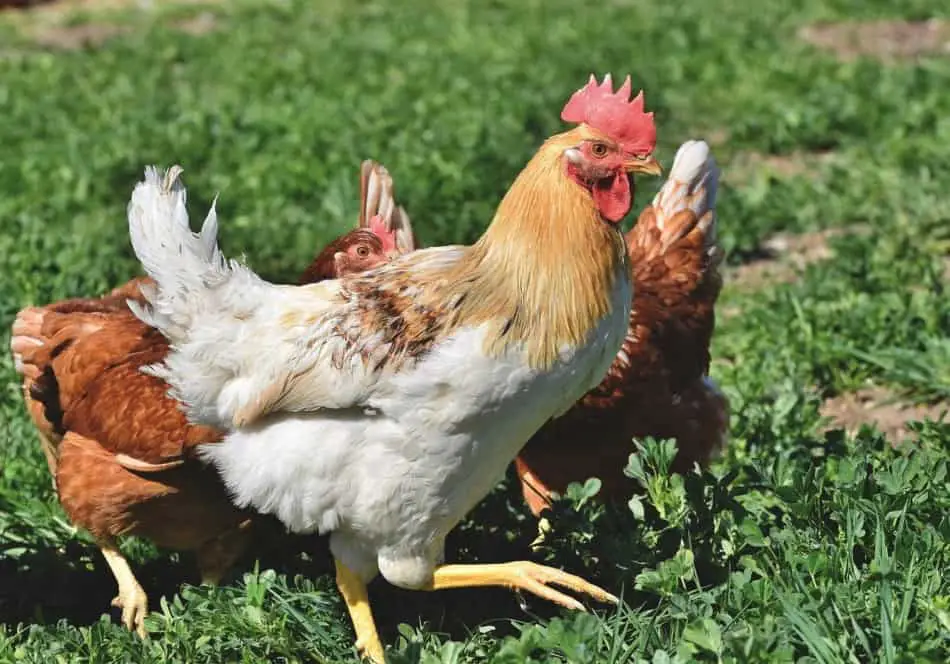
Wrapping up: Keeping Chickens at home
Don’t let any of the above stop you from keeping chickens at home. We feel it’s important if you’re going to keep backyard chickens that you know exactly what you’re getting yourself into.
Chickens make great pets. Let me just say that out loud.
We love ours and we only have a small conventional garden. Our chickens are part of the family now and they reward us with fresh, yummy eggs daily.
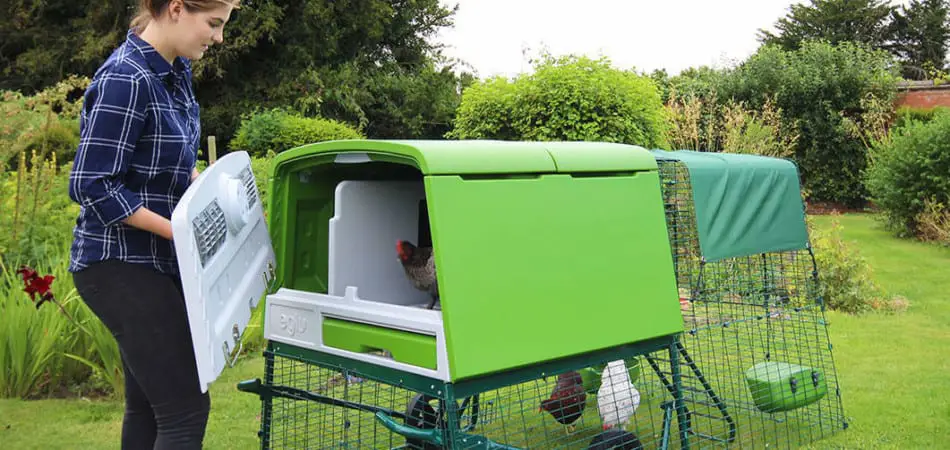
We play our part by providing them with a suitable coop which we purchased from Omlet.com you can see it here. We also added the wire run which allows them room to fly and flap around.
However, a wooden coop would work just as well. The ones below would be fine for keeping chickens at home.
Here is a small selection of coops

